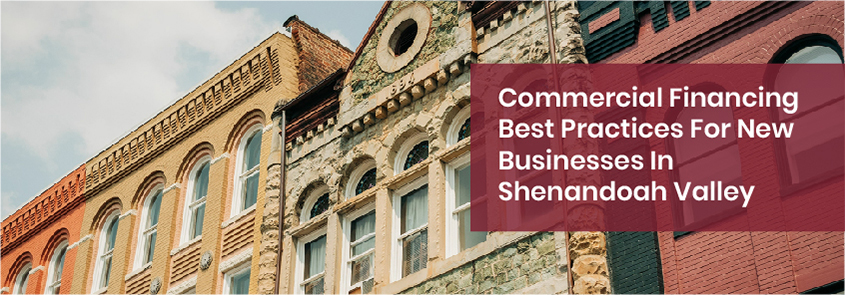Commercial Financing Best Practices for New Business in Shenandoah Valley
Launching a new business requires expert wrangling of multiple moving parts. Luckily F&M Bank is here to help you with the financial side of starting or growing your small business. Getting a small business loan in the Shenandoah Valley should not be complicated. F&M Bank’s friendly lending team is here to provide the information and insight that you need to obtain the best commercial financing for your sole proprietorship business in Virginia.
What is a business loan?
When a bank provides financing through a business loan, they are lending your business the money it needs in return for interest and fees. – As the business owner, you must make regular payments to the bank. – These payments are for repaying the loan amount and interest. – The payments are made over a specific period of time.
Lenders determine business loan interest rates and durations based on the borrower’s creditworthiness and the type of loan. The borrower’s creditworthiness plays a key role in determining the interest rate and duration of a business loan. Additionally, the type of loan also influences these factors.

What is a sole proprietorship?
Sole proprietorships are the smallest of the small businesses. Any individual conducting business activities automatically falls into the role of sole proprietor. Jewelry makers, writers, graphic designers – anyone working for themselves and making money is operating a sole proprietorship business.
No separation exists between the business and the owner in a sole proprietorship. You get all the profits but also all the debt and liability that come with running the business. Running a sole proprietorship business has distinct advantages and disadvantages.
Benefits of a sole proprietorship
- Licensing and permitting for a sole proprietor business is simple and inexpensive.
- A sole proprietorship writes up profits as your personal income and does not require separate tax filing.
- Business decisions are easy because there are no employees or board members to consult.
Disadvantages of a sole proprietorship
- Starting and running a sole proprietorship can be challenging because there are few opportunities for investors to invest in the business.
- Loan approval can be difficult for a sole proprietor with no business credit history and limited collateral.
- Personal liability is unlimited for sole proprietors because there is no legal distinction between the owner and the business.

Types of Business Loans
When you need money for your small business, there are many different types of commercial loans from which to choose. It can be confusing trying to decide which type of financing is best suited for your unique business needs. Here is a brief overview of some of the different business loan financing options available. The knowledgeable associates at F&M Bank can help you narrow down the best loan product for your small business.
Business Term Loan
A lump sum loan, business term loans have fixed interest rates and predetermined payback schedules. A business term loan will give your company an injection of cash to use for a large purchase. As soon as you receive the loan amount you will begin to accrue interest and start monthly payments.
Business Line of Credit
A line of credit is a preapproved loan amount that you can access over time, similar to a credit card. Rather than receiving a lump sum payment, business owners can draw from their commercial line of credit as needed.
With a business line of credit, you only pay interest on the money you borrow. You do not pay interest on the full approved amount. One loan application gives you access to funds that you can take as needed during a set draw period.

Government Assisted SBA Loans
SBA business loans in Virginia have lower interest rates and easier approval conditions. This is because they receive support from the U.S. Small Business Administration. This government money helps banks give riskier loans to new and small businesses. The government promises to pay part of the losses if the business can’t pay back the loan.”
SBA loans have fees and restrictions. However, they can provide the funding needed to stay afloat and grow for those who qualify.
Merchant Cash Advance
A business cash advance is appropriate for businesses that receive a high volume of credit card sales. As the business owner, the bank recoups a cash advance through merchant account services fees and interest. When a client pays with their credit card, the transaction deducts a higher fee from your profit. This fee gradually repays the cash advance.
Equipment Loans
When your business needs new equipment like furniture, computers, or heavy machinery, an equipment loan is the right choice.” The bank will consider the purchase cost, equipment lifespan, and your ability to repay the loan. They will think about how much the purchase costs.
They will also consider how long the equipment will last. Lastly, they will assess if you can pay back the loan. Typically, the equipment itself will serve as collateral for the business term loan.
Business Credit Cards
Business credit cards can be used for making purchases during slow seasons or covering large expenses, similar to personal credit cards. Business credit cards also build your business credit score which will help you qualify for future commercial loans.
Business owners can keep their business expenses separate from personal spending by using a business credit card. This helps maintain financial organization and clarity. It also simplifies tracking and managing expenses for tax purposes.
Additionally, it can help establish a clear financial record for the business. This can help at tax time by making it easy to find and list your business deductions.
Commercial Mortgage Loans
When you need land for your business or a commercial building, a commercial mortgage is the first step. Warehouses, offices, and retail space can be purchased for your business even if you are a sole proprietorship. Owning the commercial property that your business relies on can add a sense of security as well as increase your business credit and equity over time.
Personal Loans
As a sole proprietor, personal and business finances are often mixed together. In this case, a personal loan can be a good choice for funding needs.
Personal loans are usually for smaller amounts than commercial loans. The approval process for personal loans is usually easier than for business loans. Your personal credit history and debt to income ratio can help you secure the money you need to help your business succeed.

How do I get a business loan?
Applying for a business loan is similar to any car loan, mortgage, or personal loan you may have received in the past. A local lending team will take into account your personal credit history, cash flow, debts, and collateral.
The bank will review your business finances. This includes looking at your profits, debts, and how long you’ve been in operation. They will also examine your personal finances.
If you are thinking of getting a small business loan in the Shenandoah Valley, gather the following documents:
- Business plan
- Profit/loss forecast and growth plan
- Business license and registration
- Personal and business tax returns
- Bank account statements
- Invoices and sales records for your business
- Current lease or mortgage for your business
Get the commercial funding you need from F&M Bank
F&M Bank proudly offers business lending in the Shenandoah Valley. Small businesses and sole proprietorships help our community thrive, and we are here to support your financial growth. Our knowledgeable associates in Harrisonburg & Augusta County offer the best business loan interest rates. They use local insight to ensure you get the best commercial loan for your needs.
Commercial lending doesn’t have to be complicated. Contact F&M Bank and we will be glad to help answer your questions about getting started. Stop by one of our convenient locations to begin the small business loan process today.




